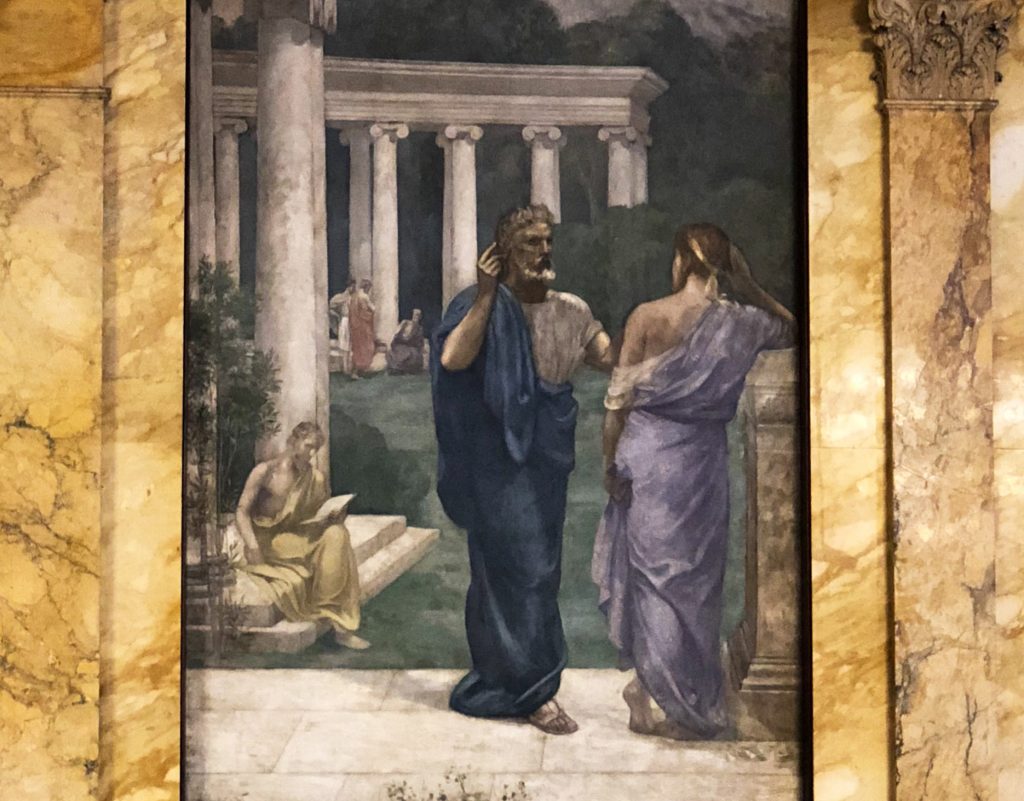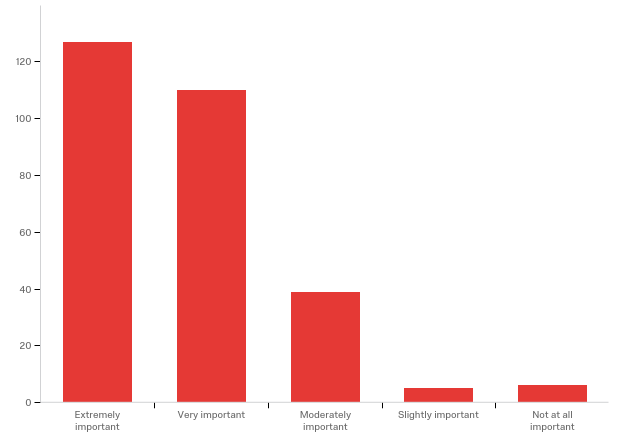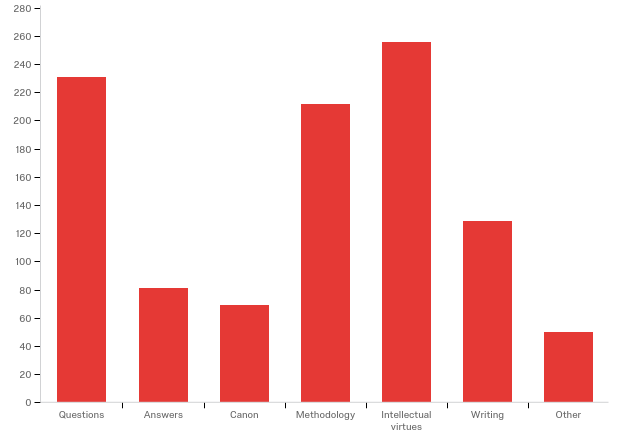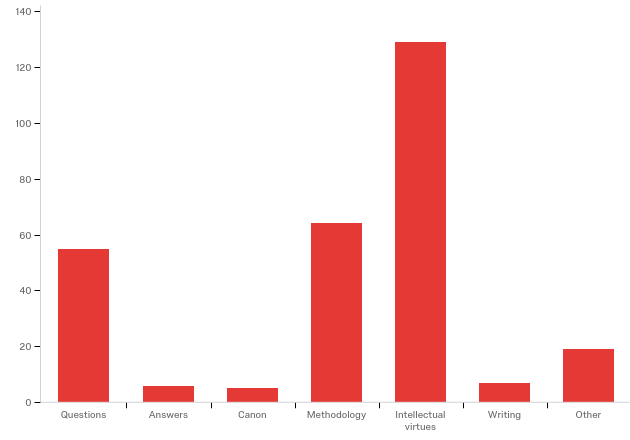Teaching Gen Ed Students the Value of Philosophy (guest post by Andrew P. Mills)
Earlier this year, Andrew P. Mills , professor of philosophy and director of the Integrative Studies Program at Otterbein University, and president of the American Association of Philosophy Teachers, conducted a survey about teaching non-philosophy majors and getting them to see the value of philosophy.
In the following guest post*, which initially appeared at the Blog of the APA, Professor Mills reports on his findings.
Teaching Gen Ed Students the Value of Philosophy
by Andrew P. Mills
The news of philosophy departments under threat is disturbingly familiar to many of us. We bemoan the latest news of the elimination of a philosophy major (see here, here, and here) or the slashing of faculty positions (see here, and here) and wonder why our ‘stakeholders’ can’t see the value of what we do. Indeed, the APA has recently developed a “Department Advocacy Toolkit” to help departments at risk of reduction or elimination.
At the same time, it is worth reflecting that the vast bulk of what we do when we are in the classroom is teach students whom we will likely never teach again. We try to “convert” some of them to majors or minors (the APA’s Toolkit has tools for that), yet the truth is that our missionary work fails much more than it succeeds. Since these “one-and-done” students who are in our classes to meet university general education requirements are the vast majority of the students we teach (more on this below), they are our ambassadors to the rest of the university: if we teach them well, other students, faculty, administrators (and maybe others beyond the university walls) will know. And if we teach them poorly, even more so. Yet so many of these students arrive in our classes resistant not just to the idea of having to take another required course, but resistant to the philosophical enterprise itself. Perhaps if we can help those students come to see the value of philosophy, we can help change public opinion about our discipline.
How might we do that? There are some ideas in the results of a survey I conducted this past spring of 280 or so North American philosophy faculty on just this question. (I don’t want to clutter this post with demographic data regarding the survey respondents, but I do believe that, at least in terms of rank and institution type–the two demographic factors I asked about–the survey respondents are fairly representative of the universe of those who teach philosophy at the college level in North America. In what I say below, I will assume, therefore, that the results from my survey sample are an accurate representation of North American college philosophy instructors generally. Those who are interested in the demographic issues can raise those questions in the comments.)
Philosophy departments (along with departments of English, modern languages, math, chemistry and physics, among others) are heavily “service” departments. We are departments with relatively few majors but lots of students who take our classes because the are required by university general education requirements or because they are required by the students’ major (nursing majors, for example, take chemistry courses and engineering majors take physics). My survey confirms not only that we all teach a lot of these “Gen Ed” students, but that a high percentage of the students we teach each year are Gen Ed students (as opposed to majors, minors, or graduate students). Over 75% of us teach at least 50 Gen Ed students each year and 41% teach at least 100. (Figure 1) More interesting, perhaps is the data the percentage of the students we teach each year who are Gen Ed students. (Figure 2) For nearly 80% percent of us, at least 61% of the students we teach in a typical year are Gen Ed students. And, perhaps more shockingly, for nearly half of us, over 80% of the students we teach each year are Gen Ed students.
Given these results, it stands to reason that we should think carefully and intentionally about how we teach those students who form the bulk of the people we teach each year. There are many questions we might ask about teaching Gen Ed students, from pedagogical approaches, to topics, to readings, to the kind of assignments we would ask them to complete. The question I am interested in here, however is how we can teach our Gen Ed students about the value of the philosophical enterprise.
A satisfyingly large number (82%) of us said that it was either “extremely” or “very” important that our Gen Ed students come to value philosophy as a result of taking our classes (Figure 3).
Philosophy is multi-faceted, though, and so I identified aspects of philosophy and asked respondents to think about which of these aspects they want their Gen Ed students to value. While my identification of the “aspects” of philosophy is by no means canonical, I hope readers will see that it captures much, if not all, of what we think philosophy is (especially as we teach it to our Gen Ed students):
- The questions philosophy tends to ask (e.g., What makes an action right? What are the conditions of knowledge? Is the mind identical to the body?)
- The answers philosophy gives to its questions (e.g., Utilitarianism, Substance Dualism, Skepticism)
- Philosophy’s canonical texts (e.g., Apology, Meditations on First Philosophy, The Analects, etc.)
- Philosophical Methodology (e.g., Thought experiments, conceptual analysis, drawing distinctions, reconstructing arguments, formal logical methods, understanding informal fallacies)
- Philosophy’s intellectual virtues (e.g., openness to criticism, precision, commitment to truth, adopting the principle of charity, intellectual humility)
- The ways philosophers write (e.g., argumentative essays)
I asked this question twice, first allowing respondents to choose as many aspects as they wanted, and then asking them to choose the aspect they most wanted their Gen Ed students to value. The results here surprised me (see Figures 4 and 5).
Given the chance to choose as many aspects as they wanted, more than 75% chose Methodology, more than 80% chose Questions and more than 90% chose Intellectual Virtues. Again, this is not a question about the most important learning goal in our classes, but rather a question about which aspect(s) of philosophy we think it is important for our Gen Ed students to come to value.
These same three aspects were most preferred when respondents were asked to choose the one aspect that was most important (Figure 5) with more than 45% choosing the Intellectual Virtues, far and away the most popular choice.
Two things stand out to me here. One is how strongly we want our students to value the intellectual virtues. Has this always been so, or is it a product of our particular political moment? Do those of us who want our students to value the intellectual virtues of philosophy make the acquisition of those virtues an explicit learning goal in their classes. And, if so, what we do in order to help students acquire those virtues? (Though I haven’t used it in my classes, I recently became aware of Jason Baehr’s project on teaching the intellectual virtues, and it looks to be an amazing resource.)
The second surprising result is the low scores for Answers and Canon. So many of us feel a strong attachment to the “content” of our classes: we worry about “covering” all the content, we are dismayed when we didn’t “get to” that last reading, and resist spending class time helping students improve their writing or in small group tasks (for instance) because we fear doing so means less time where we can lecture on the content. Yet the two aspects most closely connected to content–Answers and Canon–are the ones that scored the lowest when faculty were asked to select the aspect of philosophy they most want their students to value. They even scored low when faculty were allowed to choose as many aspects as they wanted (Figure 4). There may be other reasons why faculty think philosophy’s “answers” and canonical texts should play a central role in their Gen Ed classes, but they don’t seem to be aspects of our discipline we think students should most value.
Once faculty selected the aspect of philosophy they most wanted their students to value, I asked them (in a free-response question) why they wanted their students to value that aspect. Coding the free-response questions is still a work in progress, but three reasons are, and likely will remain, prominent: (a) that the relevant aspect is foundational for work in other courses and/or for life after college (24% of respondents said this); (b) that the relevant aspect is conducive to students’ happiness; (21%) and (c) that the relevant aspect will enable the student to improve the lives of others (17%). The raw counts, not the percentages, are in Figure 6.
These three reasons in defense of philosophy are common ones. How many of us talk up philosophy because it will help students in law school? Or tout the idea that the unexamined life is not worth living? Or that epistemically humble people who are open to diverse points of view, can engage in reasoned debate, and can speak truth to power strengthen our democracy? And while some of these reasons support some of the six aspects more than others, it was interesting to note that among those who selected intellectual virtues as the most important aspect, all three reasons were equally prominent. The survey covered more territory (about the obstacles to students’ valuing philosophy, and about what we do to help our students see philosophy’s value), but I want to draw some conclusions from even this snapshot of the results.
What I’ve said so far suggests that, if we find ourselves in line with the plurality of respondents to my survey, we should loosen our attachment to our treasured content, make acquisition of the intellectual virtues a prominent learning goal in our Gen Ed courses, and figure out ways to teach our students so that they might acquire them. If we think the acquisition of the intellectual virtues (for instance) is valuable because it will make our students happier, what are we doing in class to help our students make that connection? If we believe that mastering philosophical methodology will help our students in their other classes and/or in their lives after college, are we enabling them see how? But even if you would choose a different aspect, and defend it with a different reason, it’s critical, I believe, that we be explicit with our Gen Ed students about what is valuable about what they are learning in our courses, why, and help them see that reasoning for themselves.
I’m well aware that there are other outcomes for our classes besides the one regarding valuing philosophy (many of these outcomes might be imposed upon our classes by our departments or universities), and it is challenging to help our students meet all the learning outcomes, but helping our Gen Ed students come to see the value of philosophy needs to be a priority for all of us. I’m eager to hear how you rise to that challenge in your own Gen Ed teaching.
Art: Pierre Puvis de Chavannes, “Philosophy” (mural at Boston Public Library)









Thanks for these data and for your helpful discussion of them, Andrew.
I’d like to recommend some relevant articles:
For research on specific debiasing activities (which, I take it, increase intellectual virtue):
Beaulac and Kenyon, “The Scope of Debiasing in the Classroom,” forthcoming in Topoi
On the benefits of improved critical thinking skills:
Butler et. al, “Predicting Real -World Outcomes,” Thinking Skills and Creativity, 2017
On the question of how to improve students’ critical thinking skills, the research seems to strongly suggest that argument mapping works best:
Van Gelder, “Using Argument Mapping to Improve Critical Thinking Skills,” The Palgrave Handbook of Critical Thinking in Higher Education, 2015.
These are helpful resources. Thanks! Perhaps I’ll put together a resource list. Other suggestions welcome!
Thanks for this, Andrew.
I do think it’s worth pointing out that we don’t need to insist on an opposition between the ‘content’ with respect to cannon and the methods and intellectual virtue that most of us prioritize. The key is to be reflective about the use of canonical debates and texts and how they can be used to teach the methods and intellectual virtues you’re trying to promote.
My own percentage of Gen Ed students (=non major/minors) in any given semester is easily 90% or higher. But I frequently anchor my syllabi around texts from the usual canon. But when I do I think of part of my job in the class is to explain to students why I think these texts and ideas matter. And, more importantly, I encourage students to challenge me and themselves with those questions.
I recently taught a course to (almost 100%) Gen Ed students called “The Wisdom of Socrates.” I knew I would enjoy teaching it, but I was surprised how engaged most of the students were. Some even complained when we got to contemporary works that they missed the beauty of Plato’s dialogues – not something I emphasized myself. And at least 3 students chose to add philosophy as a minor or second major because of this class.
See also this account by James Rocha of his own undergraduate path to philosophy through Descartes and the British Empiricists. http://blog.hackettpublishing.com/teaching-value-theory-to-the-disenfranchised/
Thanks, Derek. That piece by James Rocha is one of my favorite from that volume. I recommend all the essays there. Indeed, it was the fact that so many of the contributions mentioned the issue of teaching Gen Ed students that inspired my survey.
You’re also right that there aren’t hard divisions between these aspects of philosophy. I do think, all the same, that it’s worth thinking about why we value the canonical text so much in our Gen Ed classes. Is it because they exemplify the virtues we care about? Is it for some “cultural literacy” reasons? Something else? Both?
Whatever the reason, we need to be explicit with ourselves and our students why we are doing what we are doing in our classes.
Andrew, I totally missed that you were one of the editors of the book that includes Rocha’s essay! I look forward to reading the other contributions.
In any case, I completely agree:
“Whatever the reason, we need to be explicit with ourselves and our students why we are doing what we are doing in our classes.”
What about philosophical habits? Something like: Always questioning and asking questions, not simply accepting what one reads or hears at face value, looking for consistency and unstated assumptions, considering that there might be counter-arguments or responses to counter-arguments. These are similar to virtues or methods, but the thought (the hope) is that these are things a student would come to do as a matter of course.
Thanks for this. I did need to keep the options to a limited number to help the analysis, but I would categorize these habits as virtues.
Yes, good, thanks. By calling them “habits” I mean to emphasize that they are not just things that one learns to do, but things that one does always, not just when doing philosophy but when reading an article in the newspaper, hearing a speech, etc.
At the elementary level, where I teach, “intellectual virtues” and “habits of mind” are used basically interchangeably, with “habits of mind” a more child-accessible term. If undergrads come up through a similar system, this may be a concept they are already familiar with and worth building off of. I tend to use both with my kids, since both terms carry useful connotations: virtues being good things to do, and habits being part of your customary way of thinking.